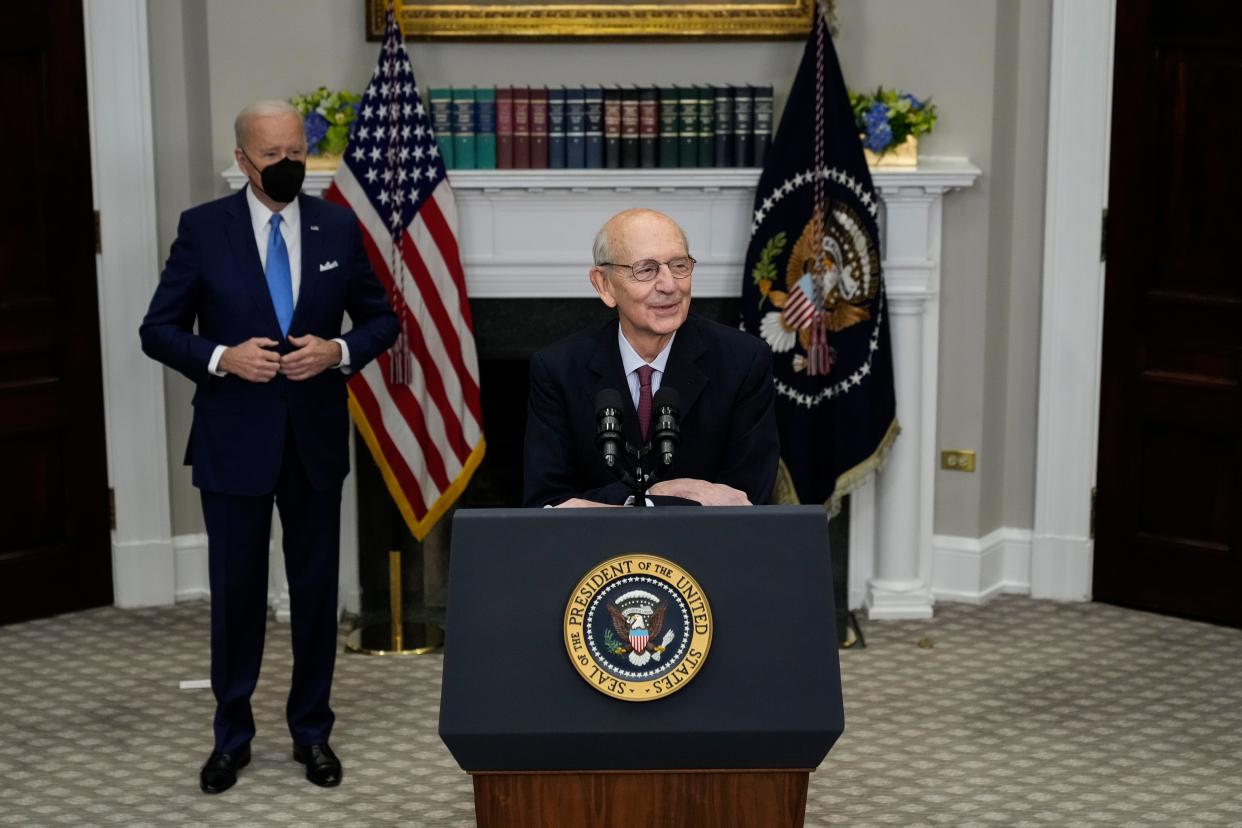OnPolitics: The president announces Supreme Court Justice Stephen Breyer's retirement

- Oops!Something went wrong.Please try again later.
- Oops!Something went wrong.Please try again later.
Happy Thursday, OnPolitics readers!
President Joe Biden officially announced the retirement of long-serving Supreme Court Justice Stephen Breyer, 83, later this year.
The president said he's been considering potential candidates since last year.
During a White House event, Biden called Breyer, the second-most senior associate justice, "a model public servant, in a time of great division in this country" and vowed to nominate a "historic candidate" who is "worthy of Justice Breyer's legacy."
"We all had high hopes for the mark he would leave on the history of law and the Constitution," Biden said. "And he's exceeded those hopes in every possible way."
It's Amy and Chelsey with today's top stories out of Washington.
Breyer's most notable cases and dissents
Breyer, who took his seat on the Supreme Court in 1994, wrote on some of the most consequential cases brought before the bench in history, from the First Amendment to voting rights.
Some of his most memorable dissents include Clinton v. New York (1998), which struck down the "line item veto," or a president's ability to veto certain provisions of legislation approved by Congress. Breyer that the decision "skirts a constitutional edge. But that edge has to do with means, not ends."
In his dissent to Glossip v. Gross (2015), which held that Oklahoma could use midazolam as an initial drug to administer a death sentence despite possibly subjecting an inmate to pain, Breyer questioned the constitutionality of the death penalty. He wrote that "Rather than try to patch up the death penalty’s legal wounds one at a time, I would ask for full briefing on a more basic question: Whether the death penalty violates the Constitution."
And in his majority opinion for Stenberg v. Carhart (2000), which struck down a Nebraska law banning late-term abortions, Breyer determined the law was unconstitutional under Roe v. Wade.
"All those who perform abortion procedures using that method must fear prosecution, conviction, and imprisonment," he wrote. "The result is an undue burden upon a woman's right to make an abortion decision."
When will we hear more? Biden announced Thursday that he planned to name Breyer's successor by late February and pledged to nominate a Black woman to the highest court.
Want this news roundup in your inbox every night? Sign up for OnPolitics newsletter here.
Real Quick: stories you'll want to read
Ukraine: The U.S. and Russia are still in talks to find a diplomatic solution to the conflict even as Russian troops exercise in the region and the U.S. sends heavy weaponry to Kyiv.
Presidents and the press: President Joe Biden labeled Fox News' Peter Doocy as a son-of-a-you-know-what – the latest dust-up in the rocky relationship between presidents and reporters. Here are some of the most historic president-reporters smack-downs.
What to know about Russia and Ukraine's militaries: While Russia is still the superior military power and would almost certainly prevail, Ukraine’s defense forces could inflict significant damage on Russian troops, according to some experts.
Kellyanne Conway memoir coming in May: Former White House counselor Kellyanne Conway has a memoir out May 24: "Here's the Deal" is billed by her publisher as a look beyond the headlines of the Trump administration and her family life, including her husband and prominent Trump detractor, George Conway.
The Army has an alarming suicide problem in Alaska
The Army's mental health emergency in Alaska spiked in 2021 with 17 suspected suicide deaths – more suicides than in the previous two years combined.
The crisis has deepened in recent months: Eight soldiers have died in cases of suspected suicide since October, according to figures released by the Army to USA TODAY. The deaths have rattled soldiers there and seized the attention of the Pentagon's top civilian and military leadership as well as lawmakers on Capitol Hill.
The Army is rushing resources and focusing attention on Alaska during the dark, frigid winter to prevent more suicides. The issue has defied conventional solutions, including more than $200 million spent in recent years to improve working conditions and barracks for soldiers in a far-away state where temperatures can drop to 60 degrees below zero and endless summer days disrupt sleep.
The 17 confirmed and suspected suicides – the Army classifies deaths as suicide after completing its investigation – eclipse the seven cases in 2020 and eight in 2019. Figures released by the Army to Congress, and obtained by USA TODAY, show that Alaska had averaged about six suicide deaths a year from 2016 to 2020.
Among those who died by suicide in 2020 and 2021, almost all were men, according to the data. Two-thirds were white and about half were married and ages 21 to 25. Gunshot wounds were the primary cause of death.
Struggling to get prompt professional help: The Army's suicide deaths in Alaska, which have been devastating for families, also have deeply affected soldiers serving there. Soldiers cite horrific encounters and complain of long waits to see behavioral health counselors.
Today is International Holocaust Remembrance Day. Read about how one woman's family saved a man during the Holocaust. Years later, the two reunited and fell in love. — Amy and Chelsey
This article originally appeared on USA TODAY: President Biden announces SCOTUS Justice Stephen Breyer's retirement

